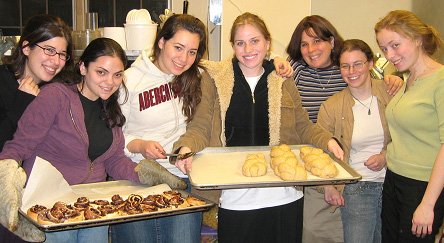
The typical motherly question of “what did you learn in school today” now has a new meaning for many coeds at 
Through a radically new approach to Jewish education, the Chabad House at Rutgers offers young men and women on the college campus unique Jewish experience workshops in Building a Jewish Home and Family, Running a Jewish Organization, Publishing a Jewish Newspaper, Marketing and Advertising in the Jewish Community, Jewish Chaplaincy in Hospitals, Nursing Homes, Juvenile Prisons, and Children’s Rehabilitation Centers, as well as fun culinary activities such as Hamantaschen baking for Purim, and Matzah baking for Passover.
According to campus Rabbi Baruch Goodman, “keeping strong and committed to Judaism based solely on memories from Hebrew school just doesn’t make the grade for today’s college student; they need to personally rediscover their Judaism in ways that are meaningful and challenging to them now, as young adults. Chabad House is now providing them with the tools and experiences that help make Jewish living a viable option in their lives.”
The Challah Baking Workshop, led by Campus Rebbetzin Sarah Goodman, allows this 3,300 year old tradition to come alive for between 10 and 20 college women each Thursday evening. “Challah baking is more than that first attempt in Pre 1A standing in line with the rest of the class for a chance to brush the egg yolk on top of an already made twist of dough,” remarked Sarah. “What we do with the
“We begin by describing this ancient art and mitzvah as it originated in the Torah with the first Jewish woman, Sarah (wife of Abraham).” In Jewish tradition, there are three mitzvot (commandments) that are reserved for women: challah (separating a portion of dough), niddah (family purity), and hadlakat nerot (lighting candles) – known by the acronym Chanah, spelled in Hebrew chet, nun and hey. This first woman’s mitzvah is challah, that is, the privilege of separating a portion of dough from bread before baking it. This commandment comes from Numbers 15:20, where Jewish women are commanded to set aside a portion of dough for the kohein. Today, the rabbis determined that Jews throughout the world should be reminded of this mitzvah by separating a piece of dough before baking it and burning the dough. (You may have noticed that on boxes of matzah at Pesach, there is usually a notation that says “Challah Has Been Taken,” which means that this mitzvah has been fulfilled for the matzah.)
The recipe, although quite simple, calls for a few hours of waiting. So, during that time, Sarah speaks with the college women regarding their key role in setting the spiritual pace of a relationship, and ultimately of the home they will build with their future husbands one day. (Certainly not indicative of all students at Rutgers University, one student saw a flyer on campus advertising what she thought would be a workshop on challah baking “rolls,” but was in fact a lecture entitled, “The Role of the Jewish Woman.”)
Rebbetzin Sarah also gives a weekly tour of the new, state-of-the-art, 5-star spa-grade Chabad Mikvah to give students a glimpse into the beauty of the mitzvah of family purity.
“After the kneading, braiding, forming and baking, it’s time for the challahs to be taken out of the oven – 50 pounds of golden loaves destined to be served at the next night at Chabad’s Friday Night Shabbat Experience Dinner Celebration, added Sarah Goodman. “Soft, sweet and delicious whole wheat challahs to feed the army of 500 Shabbos guests we’re blessed to have each and every weekend.”


6:08 PM in New Brunswick, NJ
Shabbat Ends 7:08 PM
Friday, 4 April 2025
Parashat